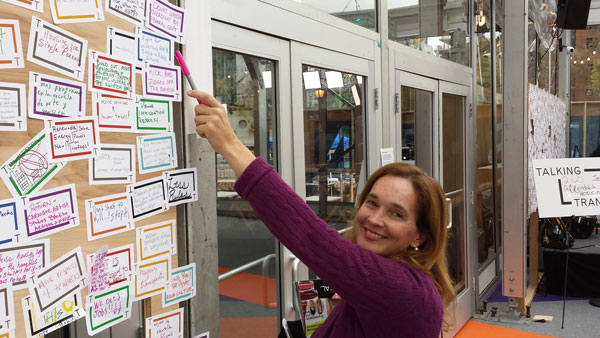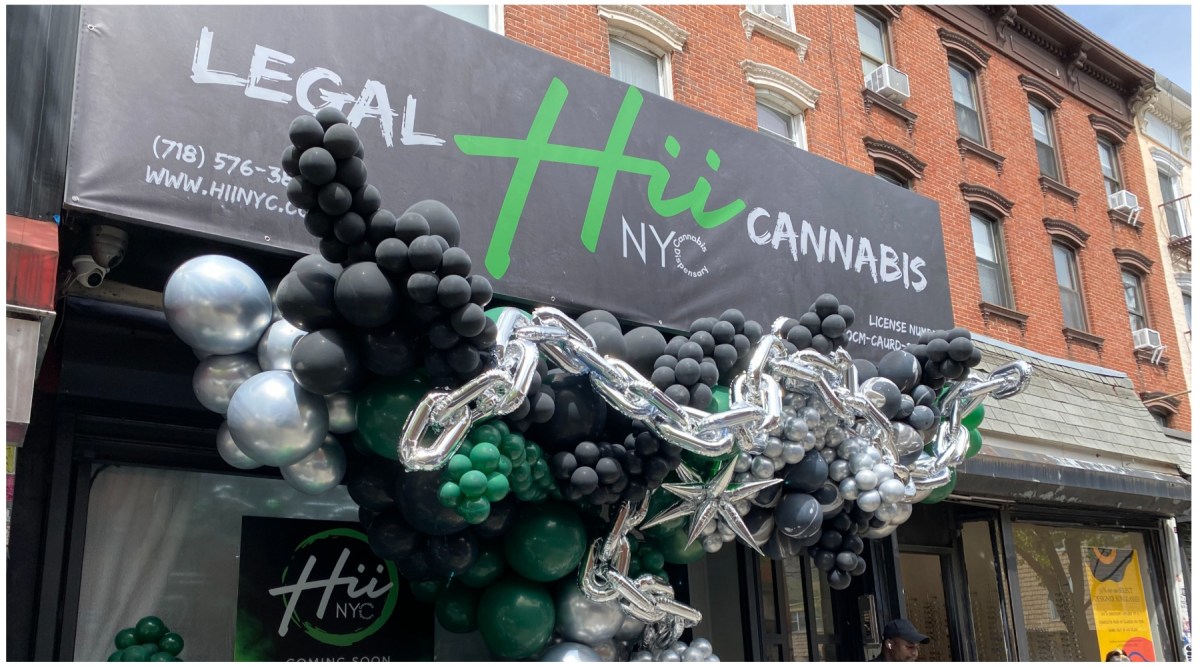
BY LINCOLN ANDERSON | The talk at the new Talking Transition tent in Duarte Square on Monday afternoon was about “A Path to ‘Real’ Affordable Housing.” The session paired personal testimonials with analysis from policy experts to explore the best way forward for the next administration to focus on low-income housing.
Speakers addressed the audience while standing in front of an image of sustainability — a 20-foot-high wall built, Lego-like, out of plastic crates.
Scott Hutchins said the group Picture the Homeless thinks the best way to ensure affordable housing is built is to create a “community land trust.”
Coney Island’s Ann Valdez, from Community Voices Heard, an organization in public housing, blasted Mayor Bloomberg’s proposed “infill” plan to shoehorn new towers with 80 percent market-rate housing into Housing Authority developments.
“It’s taking away our playgrounds and open spaces,” she said. “This is directly chipping away at our families. It will come to Coney Island over my dead body.”

A representative of New York Communities for Change said they want “real affordable housing for people making less than $18,000.”
After a round of cheers of “Affordable housing — now!” the crowd broke up into smaller discussion groups. At the “Development” table, Harvey Epstein, project director of the Community Development Project at the Urban Justice Center, said under new Mayor Bill de Blasio, they’ll push to include an affordable housing component in every project.
Meanwhile, out in the tent’s front area, Elizabeth Renner, a former New York City teacher, had filled about 20 to 30 stickers with messages for the next administration, and had plastered them all over the space’s plywood walls. Among her strong recommendations were term limits for assemblymembers, an end to using trailers for classrooms and “Kick bad judges off the bench.” While the name of the event is Talking Transition, Renner said she would actually support a fourth term for the current mayor.
“Right now,” she said, “I’m very happy with a lot of things Bloomberg did.”
Among other people’s sticker suggestions were: “Renewable solar energy panels on rooftops! Now!”… “Don’t shoot to kill! Stop it”… “Return Carnigie [sic] artist studios back to artists”…”Mas programs en la escuela de arte y musica”… “Housing for single parents”…”Mejores transporte”…”30 percent rent cap! Into Law!!!” and “Less rules.”
Talking Transition is designed as a way to engage the public in the first-ever “open” mayoral transition. The tent will stay open every day through Sat., Nov. 23, from 9 a.m. to 9 p.m. All the programs are interactive.
Talking Transition is a joint effort by hedge-fund billionaire George Soros’s Open Society Foundations, Ford Foundation, Rockefeller Brothers Fund, Revson Foundation, New York Women’s Foundation, New York Community Trust, New York Foundation, North Star Fund, Atlantic Philanthropies and the Brooklyn Community Foundation.
Trinity Real Estate provided the vacant-lot space for the tent. Trinity eventually hopes to develop the site with a new residential tower, with a public school in its base.
“This election — and this transition — in particular are a signal moment in New York City’s fortunes,” said Christopher Stone, president of the Open Society Foundations. “We are taking the opportunity to keep the energy and engagement alive after the voting is done.”
“This is a 21st-century soapbox,” said Cecilia Clarke, president and C.E.O. of the Brooklyn Community Foundation. “As a community foundation, we’re confident that Talking Transition will help inform the new administration’s agenda by bringing seldom-heard community voices to the table and providing the best solutions for problems facing Brooklyn, as well as the entire city.”
“Digital engagement” will play a key role during and after the initiative. Participants will be encouraged to tweet their ideas, questions and concerns to the unique handle @TalkNYC2013 and to use #TalkingTransition. The initiative’s Web site, www.TalkingTransitionNYC.com, will be used to survey New Yorkers and subsequently display the results.

















